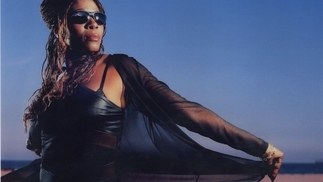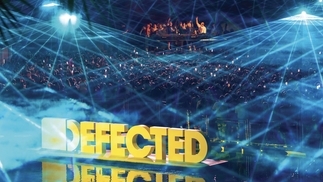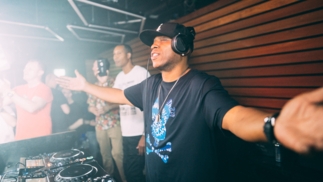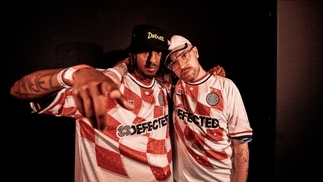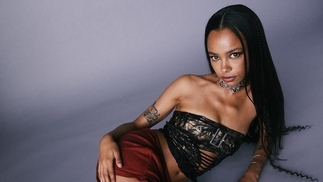Q&A: STORM QUEEN
Morgan Geist returns to his original house music inspiration.
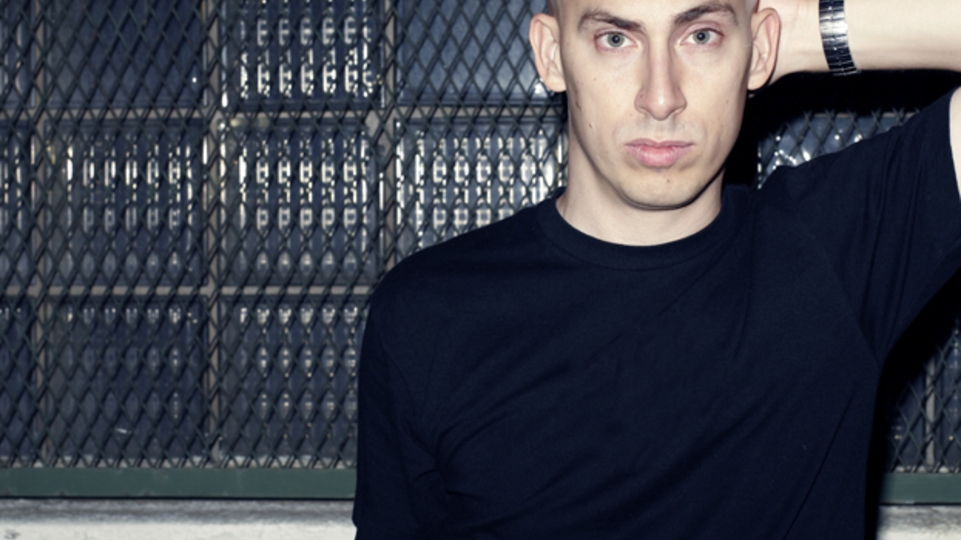
Best known as one half of nu disco/deep house duo Metro Area, Morgan Geist's new moniker — Storm Queen — is about to have a bona-fide chart hit with the previously released 'Look Right Through'. The track has had a long gestation period: produced with singer Damon C. Scott, who shot to prominence for being filmed singing on the NYC subway, it was signed to Defected at the end of last year and the MK dub became an anthem in Ibiza and at many festivals over the summer just gone.
Now picked up by Ministry of Sound and given a strange video featuring a white panther, it's set to crash into the charts in early November — rounding off a quality year for deep house chart smashes. Morgan's cult Metro Area studio project, which he started with Darshan Jesrani in 1998, is lying dormant at the moment, although they have been touring this year. “I can’t think about doing more Metro Area tracks before finishing the Storm Queen album,” Morgan tells DJ Mag. “Metro Area should have been a short-term thing, for me it was of a time. When we did it, there wasn’t a lot of stuff out there like it at all, and then stuff came out that was along the same lines. And once there’s a lot of similar records out there, it’s hard to say anything new. When we started, people of our generation weren’t open to disco and boogie, so it felt like a new sound.”
The Storm Queen record has become a bit of a sensation, can you quite believe what’s happened with it?
“I can believe anything at this point, I’ve been doing music a long time. It’s definitely a bit surreal the audiences it’s reaching, but there’s two sides to it all the time. I’m always pessimistic when I make music, I never expect it to do much and sometimes that flies in the face of what’s actually happening. When I did Metro Area, I just tried to stay focused on the music and not pay too much attention to what’s happening. So with this, it’s amusing and I feel lucky, but I’m trying not to focus on it too much.
“I get emails about chart positions, and I email them to a friend or to my girlfriend and say, ‘This is weird’. The fact that it’s MK’s remix that’s getting the attention makes it a bit easier for me as well — I feel a little removed from it. It’s my song, but obviously he crafted it in a way where it appeals to a different audience, and made it more accessible. I dunno, it all feels good to me — I’m not putting a lot of stake into any of this, it’s cool and amusing but I’m not reading too much into it. I’m thankful that it’s happening, but I’m just trying to stay focused on music.”
Are you not phased by this strange new world?
“It’s educational, and I hope to reap some benefit cos I’ve been doing music a long time. I work really hard and I’m not one of these purist underground people who doesn’t want the music to appeal — I always want as many people to get into my music as possible. But I think the important distinction is I don’t want to chase that. I’m really thankful and happy that anyone listens to my music, and I’m really thankful that it’s blown up like this, and that MK did a great job with the mix. But as far as creativity goes, there’s not a lot of overlap. It’s just luck if what you’re doing coincides with what’s appealing to people.”
Do you know MK from back in the day?
“No, I knew his music, of course, but I was never really part of any scene in New York. I just had a couple of friends who do music, and I’ve always been on my own, in a way. I had some like-minded friends, but most of my actual real-life friends love music but aren’t music people. They’re not making music or in the music business. So I didn’t know a whole lot of musicians here, it would just be acquaintances when I’d go out to clubs or whatever. And I think MK was really part of the house world that Metro Area crossed over a bit into, but not much. It wasalso kind of late, Metro Area was kinda late '90s.
“My first contact with MK was when he started remixing a bunch of versions of these remixes three years ago. Our first interaction one-on-one was a few emails.”
Now, how does it feel to have deep house as the trendy new sound when you’ve been doing deep house and disco stuff for so long?
“Again, I don’t pay any attention to this shit, really. Undoubtedly there’s something going on with what people are starting to call ‘deep house’, but I don’t really feel a huge overlap — people usually say this to me about disco and a disco revival. Music’s changed a lot, and rather than listening to a list of ingredients — it has this swing beat, the bassline’s made out of this kind of soundwave, or whatever stupid parameters people use to define genres — for me it’s more a motion and a feeling of the music. So when I think deep house, it’s always a different energy to what I hear now. The meaning’s changed. I’ve always had difficulty following the genre stuff, and I think there’s a different meaning now.
“A lot of the records now are actually sampling old house records, which is really funny to me. Even when I started Metro Area, that was a reaction to sampling. I don’t do any, and I haven’t for years — everything is played.”
So Metro Area's ‘Orange Alert’, for instance, has a really groovy organic live bass sound...
“Yeah, we did play stuff. Like a lot of electronic musicians, we’re not virtuosic players. We’re virtuosic in the studio, maybe. So we would play stuff in and keep it loose, and then there was some massaging in the computer with timing and things like that. Otherwise we would have to hire tons of people to play everything. Instead, we faked it. But yeah, trying to keep some of the life in there is important.
“With Storm Queen, obviously the influences are old house and techno, which I love, I just want to take a break from the disco stuff I’ve been doing. Techno and house have always flowed out of me really easily, working with old analogue drum machines and stuff. I feel like I can make 10 tracks a day doing that, and I just want to do something easy and quick. But it totally backfired, cos I started just doing house loops but then I’d begin the songs and arranging them, so maybe it sounds simple and not as organic as the Metro Area stuff — with disco stuff, you have grand orchestrations or whatever. It can take forever, cos I’m not the most proficient songwriter. It takes a long time for me to get everything to work.
Why did you call the project Storm Queen?
“It has esoteric roots, obscure roots. I like how Storm Queen sounds, and it obviously has house music and ballroom connotations to it. Even the words ‘Storm’ and ‘Queen’ together... the imagery it conjures up. In a way I feel like I’m being exploitative, considering that I’m a straight white guy who isn’t a very good dancer, but the roots of it trace back to this place I used to like going called ‘Storm King’ — a giant sculpture park just outside New York City. It’s this hill in the middle of nowhere with all this modern art all over it, all these crazy-looking sculptures. You’re driving along the highway in upstate New York and all of a sudden there’s all this crazy modern art sitting on this mountain. It’s actually named after the mountain, which is also called Storm King. It’s a really cool place — inspiring.”
When you started out, were you aware of the musical heritage of New Jersey, Chicago, New York and Detroit — or were you in a bit of a vacuum?
“I’m from New Jersey, and when I started making dance music records I was definitely aware of the history of Detroit and Chicago, cos I was really into that stuff. I was a late bloomer, I really didn’t get into it until the end of high school, beginning of college. When I started, I wanted credibility, so you look at the old skool guys and go ‘Oh man, I wish I had all of your knowledge’. But the truth is now, I don’t wish I had any of that, I just wish I was 20 again! Cos it’s way easier to be enthusiastic before you know what’s going on.
“Growing up in New Jersey, I was totally in a vacuum. Legendary clubs were close to me, and I had no idea. I kinda hated dance music culture, the fact that my girlfriend would go to a club and wear some tiny skirt and wait out in the freezing cold until some meathead door guy would let her in. The VIP thing, that someone would have to approve of you to get into a club — I was always more anti-establishment, a DiY kid, and that sort of approval thing bothered me. Because of that stupid attitude and misconception, I missed a lot of amazing dance music. I should’ve been going out with my girlfriend to these clubs!”
Have you thought about cashing in your chips and doing a full-on commercial EDM track?
“No. No! My whole career, we’ve always joked about doing something anonymously. Yes, I’d perhaps have the technical skills, but then anyone who knows their way around a computer can do it, it doesn’t require a lot of skill anymore. And it’s not like I’m some skilled musician, the dance music I make isn’t the most difficult stuff in the world — it’s not like I’m writing classical or orchestral pieces.
“I dunno, I think this experience is the closest brush I’ve had with the commercial world, I’ve never let stuff get out of my control before. The whole reason I even licensed Storm Queen to Defected was I figured I’ve done this one way my whole life. Straight out of the gate, I put out two records and then I was like ‘Fuck it, I’m starting my own label, I don’t want to deal with other record labels’.
Even when Metro Area was succeeding, my partner Darshan and I were really pure about what we wanted to do — and I think that worked against us. There’d be a lucrative license or a use for an advertisement, and we’d say 'No, we don’t want our track on a Heineken ad’, or something like that. But now the business has changed so much that if you don’t want to have a second job, unfortunately you have to either be doing academic music — where you’re getting a grant from somewhere — or compromise a bit and say, ‘OK, I don’t love this advertisement or this movie that they want to use it in, but I have to say yes’. Things have changed in that way.
“But I don’t think I would do what you’re talking about. I can’t do music without investing in it. I couldn’t do some stupid track just for the cash, and not invest myself somewhat in it. I’d have to start thinking that way, and that would either make it not a big commercial track — cos I’ve never really had that inclination — or I would turn into one of these people that make that fucking shit, which I don’t wanna do either. It’s more important to me to stay creatively stimulated throughout my life. I feel like I’m really lucky to be getting the success I’m getting. I just want to keep making good art, and if things like this happen...”


